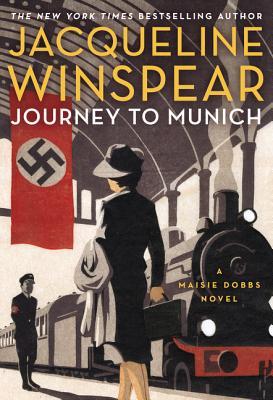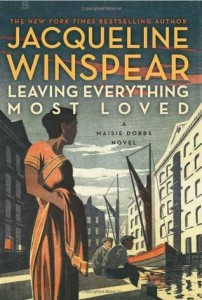 Journey to Munich (Maisie Dobbs, #12) by Jacqueline Winspear
Journey to Munich (Maisie Dobbs, #12) by Jacqueline Winspear Formats available: hardcover, ebook, large print, audiobook
Series: Maisie Dobbs #12
Pages: 233
Published by Harper on March 29th 2016
Purchasing Info: Author's Website, Publisher's Website, Amazon, Barnes & Noble, Kobo, Bookshop.org
Goodreads
Working with the British Secret Service on an undercover mission, Maisie Dobbs is sent to Hitler’s Germany in this thrilling tale of danger and intrigue—the twelfth novel in Jacqueline Winspear’s New York Times bestselling “series that seems to get better with each entry” (Wall Street Journal).
It’s early 1938, and Maisie Dobbs is back in England. On a fine yet chilly morning, as she walks towards Fitzroy Square—a place of many memories—she is intercepted by Brian Huntley and Robert MacFarlane of the Secret Service. The German government has agreed to release a British subject from prison, but only if he is handed over to a family member. Because the man’s wife is bedridden and his daughter has been killed in an accident, the Secret Service wants Maisie—who bears a striking resemblance to the daughter—to retrieve the man from Dachau, on the outskirts of Munich.
The British government is not alone in its interest in Maisie’s travel plans. Her nemesis—the man she holds responsible for her husband’s death—has learned of her journey, and is also desperate for her help.
Traveling into the heart of Nazi Germany, Maisie encounters unexpected dangers—and finds herself questioning whether it’s time to return to the work she loved. But the Secret Service may have other ideas. . . .
My Review:
It seems very fitting that I’m reviewing Journey to Munich right after The Murder of Mary Russell. If you take a look at the “Readers Also Enjoyed” sidebar for each book on Goodreads, they are effectively listed as “read-alikes” for each other.
And they are. Both feature young women as investigators in the post-World War I era. However, there are a couple of key differences. One is that Mary Russell always has her seemingly immortal partner and husband, Sherlock Holmes, at her side.
 Maisie Dobbs is singularly alone. She lost her first love to a bomb that exploded in the aid station they were working in. While he physically survived, mentally he was gone. In the interstitial period between Leaving Everything Most Loved and A Dangerous Place, Maisie married her second love, and he was killed while flying an experimental plane, causing Maisie to miscarry their only child.
Maisie Dobbs is singularly alone. She lost her first love to a bomb that exploded in the aid station they were working in. While he physically survived, mentally he was gone. In the interstitial period between Leaving Everything Most Loved and A Dangerous Place, Maisie married her second love, and he was killed while flying an experimental plane, causing Maisie to miscarry their only child.
Now Maisie is seemingly without hostages to fortune, which is one of the reasons why the British Secret Service is more than willing to recruit this indomitable and seemingly undauntable young woman. They have a specific job for her.
One of Britain’s most inventive engineering minds has been imprisoned by the Nazis at Dachau. Her mission is to pose as his daughter and bring him home. The diplomatic arrangements have already been made, or so everyone thinks.
But if things were that simple, the Secret Service wouldn’t need Maisie. And if there weren’t wheels within wheels, Maisie wouldn’t also be tasked with the sidejob of rescuing the woman who should have been piloting Maisie’s husband’s fatal plane from one too many errors of her own selfish making.
As Maisie dodges well-meaning British officials, secretive American agents, and brutal Nazi officers, she finally discovers something that has eluded her since the death of her husband and child. Now that she is in fear for her life, she comes to the dawning realization that she truly does want to live.
If she survives.
Escape Rating A: This is a hard review to write. The book is excellent, but the background of this story is frightening – as it should be.
This case takes Maisie to Nazi Germany in the late 1930s, just before World War II breaks into a hot war. Two of the framing events are the Anschluss, when Nazi Germany annexed Austria, and Prime Minister Neville Chamberlain’s infamous “peace for our time” speech. It seems so obvious in retrospect that the peace he thought he had secured was utterly impossible. What is more, at least in this story that was obvious to many people at the time, people who gave warnings that were not heeded.
In the context of the story, both the British Secret Service and those agents who would form the OSS, the forerunner of the American C.I.A. were not only aware that war was coming, but were actively preparing for it. As were at least the power brokers in the British Army.
As were the industrialists, which in the end provides the motives for many of the events on the British side of this story.
At the same time, the background seems to be a human version of the old story about the frog and the pan of boiling water. It is clear that there is an increasingly fearful and oppressive atmosphere in Germany, but most people have managed to adjust most of the time. The water has risen in temperature so slowly that they are able to pretend they haven’t noticed it. Except for the two little girls that Maisie spies playing together in a back alley. If they want to remain friends and play together, they have to hide. One of those little girls is Jewish, and as we know now, will probably be taken to the camps and killed long before the end of the war.
It is also clear from the story that the British Secret Service at least knew perfectly well exactly what the already infamous Dachau was, and that more concentration camps were being built. It is also clear that they already knew that Jews were being systematically turned into “nonpersons” in preparation for the atrocities yet to come, and that there were many organizations working to get people out before the worst happened. As it did.
Ironically, in the midst of the death and darkness, Maisie’s story finally turns toward the light. She is able to forgive the family that caused so much of her grief and pain, and as she lives under constant threat of death, she finally realizes that she wants to live, and to have the chance to use her skills and talents for the greater good, and because working makes her feel alive. She has much to do and is finally ready to do it.
But seeing Nazi Germany through Maisie’s eyes, watching as a sensitive, intelligent, thinking, feeling person experiences some of the worst of humanity or its utter lack, gave this reader chills.
Reviewer’s Note: Considering publication schedules, this book was probably completed a year or so ago. However, for this reader at least, there is a tremendous resonance between the political climate related in this story and the current U.S. presidential campaigns. Your reading may be different, but for this reader, the parallels are difficult to miss.
~~~~~~ GIVEAWAY ~~~~~~
As part of this week’s Blogo-Birthday Celebration, I am giving away the winner’s choice a copy of any book in the Maisie Dobbs series, including today’s review book, Journey to Munich. Books will be shipped by The Book Depository, so this giveaway is open to anyone who lives anyplace they ship. For those in the U.S., if you prefer an ebook, you can choose an ebook copy from either Amazon or B&N.


 The teddy bear and I welcome you to my fifth annual Blogo-Birthday celebration! I still have the original bear somewhere in the house. I’m sure he’s holding down a bookshelf somewhere, as he should be.
The teddy bear and I welcome you to my fifth annual Blogo-Birthday celebration! I still have the original bear somewhere in the house. I’m sure he’s holding down a bookshelf somewhere, as he should be.





![dreaming of books 2015[1]](https://www.readingreality.net/wp-content/uploads/2016/01/dreaming-of-books-20151.jpg)

 Fun Fact #1: As I’ve often mentioned, I’m a
Fun Fact #1: As I’ve often mentioned, I’m a  Fun Fact #4: I read
Fun Fact #4: I read  Night Hawk (Jackson Hole, #10) by
Night Hawk (Jackson Hole, #10) by 

